A Comprehensive Guide to Vedic Astrology, According to an Astrologer
Here's what to know about Vedic astrology, including how to determine your zodiac sign and how the ancient Indian practice differs from Western astrology
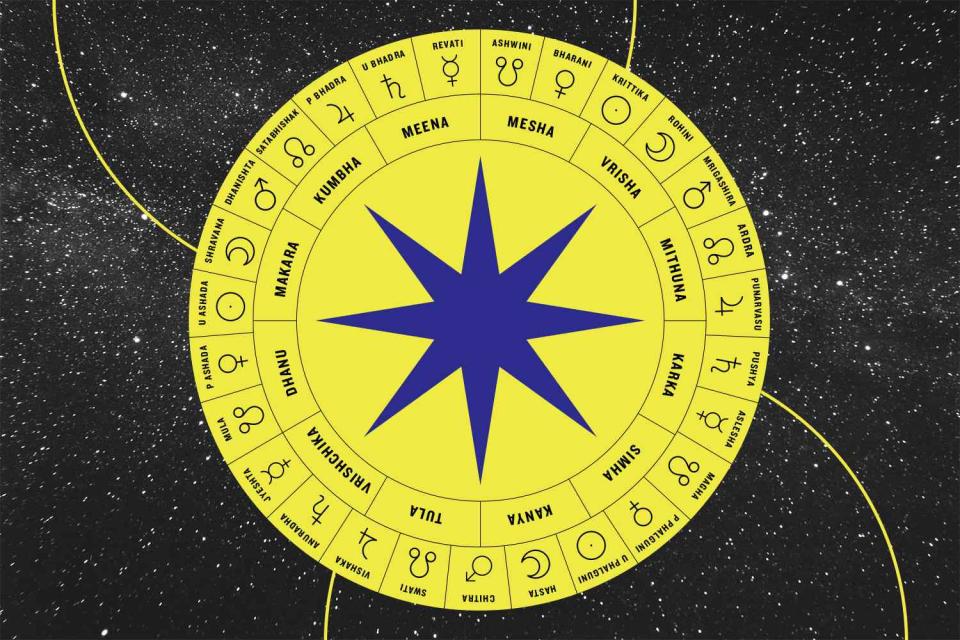
Here's what you need to know about Vedic astrology.
This ancient system of study, also known as Jyotish, originated in India thousands of years ago as far back as 1500 BCE. It is the study and belief that the celestial bodies, stars and planets influence our lives.
The word "Vedic" derives from the word "Vedas," which are the oldest sacred texts of Hinduism that serve as the primal basis of the astrology system. Hinduism draws from the Vedas, too, which makes the religion "closely intertwined" with major astrological events.
Vedic astrologer Sophie Won — who's appeared on Netflix's Indian Matchmaking and is also co-founder of Reha App — tells PEOPLE, "Vedic astrology is widely used for matchmaking in marriages in India."
In fact, Won says traditional Indian families have astrologers who "rely on birth charts" to facilitate arranged marriages. This centuries-old practice remains prevalent in India today and stands as "one of the most popular applications" of Vedic astrology.
Related: What the Year of the Dragon Means for You, According to Your Chinese Zodiac Sign
In comparison to Western astrology's emphasis on the sun, Vedic astrology prioritizes the moon. As the closest celestial body to Earth, the moon is believed to "exert the most significant energetic influence" and "serve as the conduit" to our past lives and future experiences.
"When determining astrological timing and compatibility in Vedic astrology, calculations are exclusively based on a person’s moon sign and its positioning," Won says. "The moon symbolizes the mind, emotions and the mother from whom we originate and are born into this world.
Unlike Western astrology, the outer planets — Neptune, Uranus and Pluto — aren't significant in Vedic astrology because they were discovered much later. Therefore, Won says the ancient study doesn't use them to interpret "due to the lack of historical context and information."
Read on for a comprehensive guide to Vedic astrology, according to astrologer Sophie Won!
What is Vedic astrology?
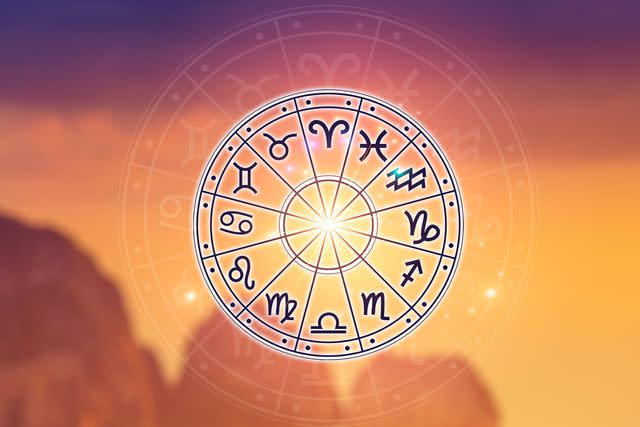
sarayut Thaneerat/Getty
Zodiac wheel.Vedic astrology is the study and belief that the celestial bodies, stars and planets influence our lives. It is based on sacred scriptures from ancient India, called Vedas, that date back to 1500 BCE.
According to these scriptures, Vedic astrologer Sophie Won tells PEOPLE "our karma is intricately linked to the positions of the stars and planets." Understanding that connection is facilitated through their analysis.
Won explains, "Our ancestors observed correlations between the positions of celestial bodies and phenomena such as environmental changes, human behavior and psychology." These observations were "meticulously recorded and passed down through generations," she says.
Vedic astrology is used "as a guiding light" for those navigating "life's complexities," Won says. "It offers insight and direction to those who may feel lost or uncertain on their life's path."
How does Vedic astrology differ from Western astrology?
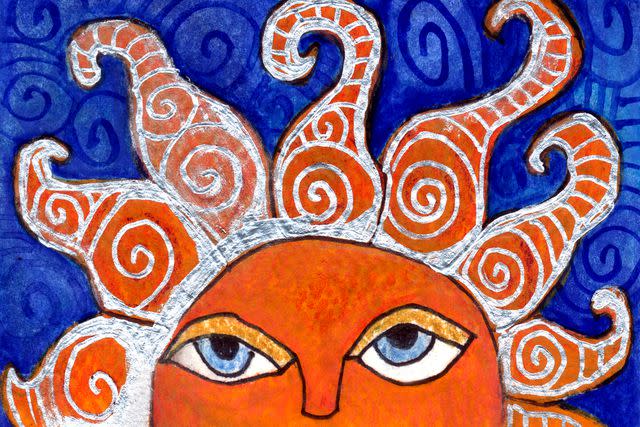
lunagraphica/Getty
Abstract sun design.There are several significant differences between Vedic astrology and Western astrology, like the previously mentioned emphasis on moon versus the sun. But the "most obvious" difference between the two studies, according to Won, revolves around zodiac signs.
For example, you might be a Cancer in Western astrology but a Gemini in Vedic astrology. "This is because Vedic astrology uses the sidereal zodiac," says Won. The sidereal zodiac is "based on the fixed positions of stars rather than the tropical zodiac used in Western astrology."
Additionally, Won notes that "fundamental principles and basis behind the systems" differ rather heavily. Western astrology is based on Greek astronomy and aligns with the Gregorian calendar, while Vedic astrology draws heavily from the Vedas.
Won says Vedic astrology is "deeply rooted in Hindu philosophy and spirituality," with concepts like karma, reincarnation and dharma playing "significant roles" in interpretations. Western astrology, meanwhile, is "deeply rooted in Hellenistic and ancient Greek philosophy and traditions," she explains.
The concept of karma and past lives are "discussed" in Western astrology, but Won says they are "not viewed as one of its main purposes" in comparison to Vedic astrology.
What is my Vedic zodiac sign?
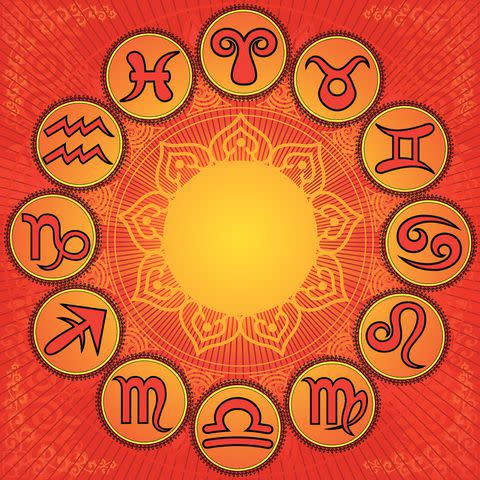
kumarworks/Getty
Astrological signsYour zodiac sign in Vedic astrology is determined by your moon sign, not your sun sign. Won says this preference derives from the belief that the moon "holds great importance" of "timing and comprehending an individual's internal world."
Due to differentiating time, the Vedic zodiac sign (sidereal zodiac) you align with may differ from your sign in Western astrology (tropical zodiac). "Western sign Aries could mean Vedic sign Pisces," Won says.
Here's how the timing system — which defines our days, years, seasons and zodiac signs — works. Time is measured by the rotation of the Earth. This rotation in Western astrology equates to one day or 24 hours.
Meanwhile, Vedic astrology factors in the procession of the equinox. Therefore, one day is approximately 23 hours, 56 minutes and six seconds. The procession of equinox accounts for the Earth rotating within a galaxy, which is also rotating which therefore makes the Vedic year approximately 20 minutes longer than a Western year.
This causes the signs to shift by one degree every 72 years, which is why Won says "your Vedic sign might differ from your Western sign." She compares this system to Celsius and Fahrenheit: "Both are current measures of the temperature but in different ways."
Below, find your zodiac sign in Vedic astrology:
Aries/Mesha: (April 14 - May 14)
Taurus/Vrishabha: (May 15 - June 14)
Gemini/Mithuna: June 15 - July 15
Cancer/Karka: (July 16 - Aug. 16)
Leo/Simha: (Aug. 17 - Sept. 16)
Virgo/Kanya: (Sept. 17 - Oct. 16)
Libra/Tula: (Oct. 17 - Nov. 15)
Scorpio/Vrishchika: (Nov. 16 - Dec. 15)
Sagittarius/Dhanu: (Dec. 16 - Jan. 13)
Capricorn/Makara: (Jan. 14 - Feb. 12)
Aquarius/Kumbha: (Feb. 13 - March 13)
Pisces/Meena: (March 14 - April 13)
In addition to the 12 zodiac signs, Won says Vedic astrology uses 27 nakshatras (lunar mansions) to "track" the Moon's movement. Western astrology doesn't use this at all. "The nakshatras are an important foundation in Vedic astrology because they give further insight into the details of a person and favorable timings," she explains.
Related: Here's What the Hindu Celebration Holi Means for You, According to Your Vedic Zodiac Sign
What does the ascendant sign mean in Vedic astrology?
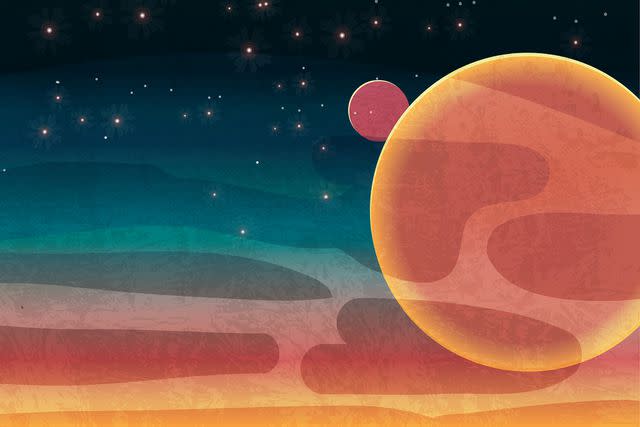
JDawnInk/Getty
Space painting.Won says Vedic astrologers place "significant emphasis" on the ascendant, also known as your Rising sign. It represents the zodiac sign that was ascending in the east at the moment of your birth.
The ascendant is "the starting point" of your birth chart, forming the foundation in your life. Won says she considers it "one of the most crucial aspects" in Vedic astrology because it "essentially shapes your core blueprint."
As an astrologer, Won says knowing a person's ascendant allows her to understand "the basic structure" of their entire birth chart without having to examine their planets. She compares the ascendant to a pair of sunglasses that influence how you perceive the world, others and yourself.
"Your ascendant reveals the type of sunglasses you wear and the lens through which you view life," she explains. "This lens is going to shape all the aspects of your journey and is essentially your foundation."
The Sun sign is the zodiac sign determined by the position of the sun at the moment of your birth. It represents a person's ego, identity, masculine energy, the father and serves as a reflection of their soul's drive.
"The Sun sign is critical to understanding a person's motivations, sense of purpose and their pathway," Won says. In Western astrology, The Sun sign is regarded as the "leading sign."
Won says it's important to note that the ascendant and sun sign define very different aspects of a person's personality. The ascendant represents a person's "foundation and perspective in life," while the sun sign "embodies a person's purpose and motivation."
Above all, she adds, "Both are very important when evaluating your birth chart."
Is Vedic astrology more accurate than Western astrology?
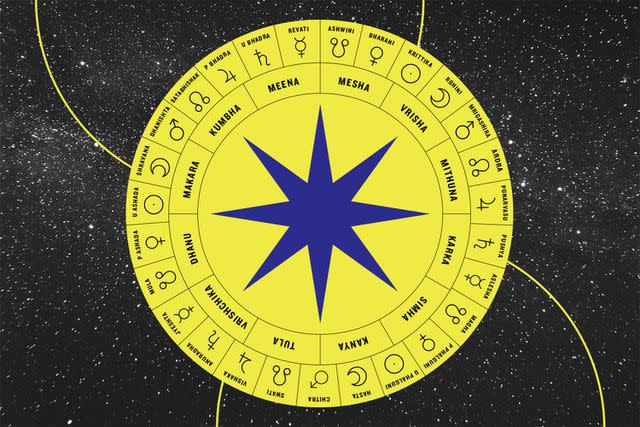
The accuracy of Vedic astrology over Western astrology is considered "a controversial topic among astrologers," admits Won. While she practices both, she says she finds Vedic astrology's "time calculations to be more accurate."
Won also considers the use of "divisional charts and timing analysis" in Vedic astrology more "detailed and precise." She adds, "I have found that the Vedic astrology timing system called the dasha timing is one of the most accurate tools for understanding your personal timing and predictions."
For more People news, make sure to sign up for our newsletter!
Read the original article on People.

